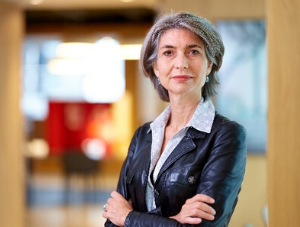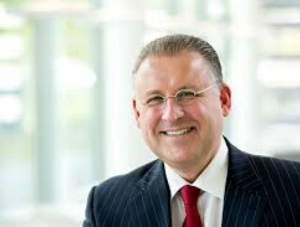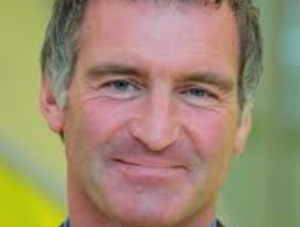| The Zero Hunger Lab: why are we also involved in COVID-19 research? |
|
|
|
| Prof. Hein Fleuren |
| Professor of Operations Research | Scientific Director Zero Hunger Lab |
| At the Zero Hunger Lab we work on reducing hunger in the world (sustainable development goal 2) by using data science. We will briefly outline the ideas of the lab in general and how corona has changed our work. The issues that might dramatically change the life of many people in the near future are very well explained in this link: https://nos.nl/l/2334114 In this presentation we’ll explain how we want to support. |
|
|
|
|
|
|
|

|
| Prof. Lokke Moerel |
Professor of Global ICT Law |
Senior Of Counsel Morrison & Foerster
|
| The new digital technologies (and in particular artificial intelligence, AI) enable many new services that disrupt existing business models. The new business models in turn present new privacy issues and ethical dilemmas, and societal resistance to the excesses of the new data economy is becoming increasingly visible and urgent. It is a challenge for established financial institutions to both drastically innovate in order to remain future-proof and at the same time take social responsibility. What are the differences between the old and the new world? What are the new ethical dilemmas and how do you prevent making the same mistakes as Big Tech? Why does innovation fail so often within the existing structures of established companies? If innovation is better achieved in small and agile teams, how does this fit into the command and control structure of compliance-driven organizations, such as financial institutions? And why does the 3 lines of defence model for risk management insisted on by supervisory authorities has an inhibitory effect on innovation in practice? We will discuss how to navigate the new world and to deploy AI for the Good. |
|
|
|
|
|
|
|
| Responsible leadership: creating shared value |
|
|
|

|
| Prof. Ronald de Jong |
| Prof. Ronald de Jong, Distinguished Professor of Practice, Tilburg School of Economics & Management | Chairman Philips Foundation and retired member of the Executive Committee at Royal Philips |
| In a ground-breaking 1970 essay in the New York Times, the late Chicago economist Milton Friedman spread a doctrine that has dominated the Anglo-Saxon business world ever since: that a company’s solitary purpose is to increase shareholder value. He died in 2006, but his mantra did not. Now that model is being turned upside down. Around the world, companies are increasingly shunning shareholder primacy that has hitherto underpinned western economics, often at the expense of other stakeholders. The new model is to create social and ecological as well as economic value, and to consider the impact of decisions – both positive and negative – on multiple stakeholders. Capitalism has to become more inclusive in order to survive as a sole focus on “maximising shareholder value” might result in irreversible social, economic and ecological issues. A new vision is needed. There are many other stakeholders that contribute to the success of a business. Creating shared value is the new doctrine. Responsible leaders take accountability for more than just the short-term financial results of their organizations. They see themselves as having an obligation to help society advance. The challenge for leaders is navigating the myriad interests of the various stakeholders responsibly. Tilburg University has a starring role to play in producing the next generation of responsible leaders who lead with purpose. |
|
|
|
|
|
|
|
| Trust in a Blockchain World |
|
|
|

|
| Prof. Eddy Vaassen RA |
| Professor of Accountancy, Economics & Management |
Trust is foundational to engaging in business transactions, yet maintaining it in a global economy where interactions often take place without physically meeting the other party, is expensive, time-consuming, and, in many cases, ineffective. Could a blockchain be part of the answer?
A blockchain is a system that consists of distributed computers (dubbed nodes), each of which may be unreliable. An important problem that a blockchain solves is how consensus can be achieved about the validity of transactions in such a distributed system that may comprise unreliable participants. The Bitcoin is the most well-known blockchain application. Bitcoin’s consensus protocol can function as a replacement of trusted third parties by creating a peer-to-peer network that does not have a central authority. The consensus protocol solves the absence of a central authority as the main problem in a blockchain. Hence, the consensus protocol is a trust protocol that replaces a trusted third party. The Bitcoin as such may not be the main interest of most business professionals. However, a blockchain, as applied in so-called smart contracts may provide efficient and reliable solutions to a wide array of business problems, including those in the fields of accounting, auditing, controlling, supply chain management, information systems, and finance. This webinar gives a bird’s eye view of the problems that need to be solved when entering into a wide variety of blockchain applications that surpass the Bitcoin. |
|
|
|
|
|
|
|
| Managing data- and computation-intensive research projects |
|
|
|
| Dr. Hannes Datta |
| Associate professor of Marketing, Economics & Management |
| Recently, a group of TiSEM researchers has launched tilburgsciencehub.com, an open-source resource repository for managing data- and computation-intensive projects. The site offers a set of guidelines, checklists, example projects, and tutorials geared at both students, researchers, and practitioners involved in data preparation and analysis. In this 1-hour lecture, dr. Datta, Associate Professor at Tilburg School of Economics and Management, will provide an overview of the available material, and showcase example workflows in R and Python that will boost efficiency instantly. |
|
|
|
|
|
|
|
| Decision-making under Uncertainty |
|
|
|
| Prof. Kuno Huisman |
Professor of Decision Making under Uncertainty | Director of business control at ASML's TWINSCAN Factory
|
| Every day, we make a lot of decisions. When it comes to simple decisions, we often do so without even noticing it. Other decisions have a considerable impact. They can also have a significant impact on the lives of others, especially when you are in charge of an entire team, or managing large budgets at work. You might want to reflect a bit longer on these kinds of decisions, but often you don't have enough time. In that case, it is valuable to be able to structure your decision-making process. In this online seminar you will get acquainted with the 'decision quality concept', developed at Stanford University. Even under time constraints and in uncertain circumstances, this concept provides tools to confidently make good decisions. Prof. Kuno Huisman reports on his experiences with the decision quality concept. |
|
|
|
|
|
|
|
|